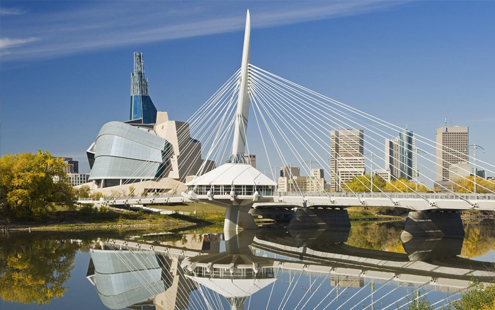Manitoba's Strategic Advantages
Located in the heart of North America, Manitoba is a land of economic and cultural diversity, a place where natural resources are plentiful and the people have created a rich and vibrant society.
More information
Invest in Manitoba |

Business Friendly, Responsive and Responsible Government – The Manitoba government's vision is that our province is a place where well-managed businesses can thrive. It has worked to make meaningful improvements to taxes, red tape, infrastructure, labour force and market access.
More information
Diverse and Dynamic Economy – Multiple industries/sectors thrive in our province. Our strongest industries include agriculture, advanced manufacturing, pharmaceuticals, aerospace, heavy-duty vehicles and equipment, mining, creative industries and many others.
More information
Competitive Business Costs – International studies have consistently shown the competitiveness of business costs in Manitoba. Businesses here enjoy very competitive costs for industrial space, labour, utilities and more. This is augmented with generous tax credits for research and development, and manufacturing investment.
Central Location and Solid Transportation Infrastructure – Manitoba is located at the heart of North America, with excellent connections across Canada, to the US Midwest and Mexico, including a 24-hour international airport (Winnipeg Richardson International Airport), a 20,000-acre inland port (CentrePort is North America’s largest inland port with foreign trade zone benefits), inter-modal rail, and a northern seaport. Winnipeg, our capital city, is a main transportation centre between Vancouver and Toronto, as well as a major node for shipping to the U.S., with three direct rail connections to the U.S.
More information
Well-Educated, Highly Skilled Workforce – Approximately half of the working age population in Manitoba has post-secondary education. As well, investments in workforce development, post-secondary education, and immigration—including a highly successful Provincial Nominee Program—ensure a continuous supply of talented workers.
More information
Clean Energy – 99% of Manitoba's electricity is generated from renewable hydroelectric sources, and our industrial electricity rates are among the lowest in North America.
Excellent Universities and Colleges and Internationally Recognized Research Facilities – Students can choose from a full range of post-graduate programs with world-class research facilities for key industries. Our post-secondary institutions welcome international students.
More information
Great Place to Live – Manitobans enjoy an enviable quality of life with affordable living costs and many cultural, sporting and leisure amenities.
More information
You'll be in Great Company – Multinational corporations located here include Price Industries, NFI Group, James Richardson & Sons, Simplot Canada, Canada Life Assurance, Boeing Canada, Ubisoft, Skip the Dishes, Pfizer Canada, 3M Canada, Cargill Canada, Wawanesa Mutual Insurance, StandardAero, and many others.
Manitoba Quick Facts
| Head of State | King Charles III, represented by the Lieutenant Governor of Manitoba, the Honourable Anita R. Neville |
| Legislative Assembly | Comprised of 57 Members elected to represent the people of Manitoba |
| Political Leader | The Honourable Wab Kinew, Premier of Manitoba |
| Area | 649,947 square kilometers (250,946 square miles); larger than Japan and twice the size of the United Kingdom Land surface area: 548,356 km2 / 211,721 miles2 Water surface area: 101,591 km2 / 39,225 miles2 Coastline: 645 km / 400 miles |
| Total Population (October, 2025) | 1,507,057 |
| Capital City | Winnipeg, population 941,600 (2024) Mayor: His Worship Scott Gillingham |
| Time Zone | Manitoba is located in the central time zone. Daylight Saving Time is in effect through the province from the second Sunday in March until the first Sunday in November. During the rest of the year, the province is on Central Standard Time. |
| Unemployment Rate (November, 2025) | 6.1% (Manitoba), 6.5% (Canada) |
| Major Industries | Manufacturing, construction, transportation and warehousing, finance and insurance, agriculture, utilities, professional services, mining, information and cultural industries. |
| Major Manufacturing Sectors | Food and beverage, transportation equipment, chemicals and pharmaceuticals, machinery, fabricated metals, plastics/rubber, furniture, clothing, printing and related, wood products, primary metals, non-metallic mineral products. |
| Real GDP, chained 2017 dollars (2023; at market prices) | CAD $78.3 billion |
| Nominal GDP, current dollars (2023; at market prices) | CAD $96.1 billion |
| Exports (2024) | CAD $21.9 billion |
| Natural Resources | Abundant fresh water, hydroelectricity, base metals (nickel, copper, zinc), fishing, forestry, gold, oil, other minerals. Manitoba is home to 30 of the 34 minerals on Canada’s 2024 Critical Minerals List, including lithium, graphite, copper and more. |
| Agricultural Products | Canola, wheat, hogs, cattle, dairy products, oats, poultry, eggs, barley, and flaxseed. |
For more information, including detailed reports on Manitoba's ten economic regions, please visit the Rural Manitoba Economic Development Corporation.
Canada Quick Facts
Canada is a confederation of 10 provinces and 3 territories. The national capital is Ottawa, Ontario, with provincial/territorial capitals designated in each province/territory.
| Form of State | Constitutional monarchy |
| Head of State | King Charles III, represented by the Governor General of Canada, the Right Honourable Mary Simon |
| Head of Government | Right Honourable Mark Carney, Prime Minister of Canada |
| Average value of Canadian dollar against major currencies (December, 2025) | US dollar = $1.41 CAD Euro = $1.62 CAD Mexican peso = $0.08 CAD Chinese renminbi = $0.20 CAD |
Stats current as of December, 2025


